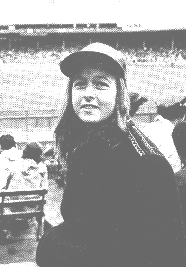Page 71
[Begin Tape 1, Side A]
Ritchie: Melissa, in our earlier interviews we've talked a lot about your professional career, and particularly the lawsuit, and today I thought we would review some of the highlights of that, and perhaps first you will tell me how you got your job at Sports Illustrated.
Ludtke: Interesting. I'm not sure we spent a lot of time on that before. We have to go back to, I guess 1973, which was the year I graduated from college with a degree in art history, little involvement in journalism in the sense that I had never worked for my college newspaper, I hadn't worked on a yearbook staff, I had not taken very many. I think I took a course on Shakespeare and maybe on women writers, but certainly didn't think of myself as a writer, certainly didn't have the skills of a journalist. So I'm not sure that would have been a natural calling for me.
But what I did have, and always had had, was a great enthusiasm for sports. I know at Wellesley I had been involved quite a bit in the setting up of the first intercollegiate crew. Wellesley had always traditionally had crew, but it was intracollegiate. There were races between the classes and races between the dorms, and they had what were called "barges," in the sense that anyone could get in and row them, they weren't going to tip over like a normal crew shell. I and about three or four other women in my class got very, very interested in crew as a sport, and by our junior year, we had started racing intercollegiately for the first time at that school. So that was just another way that I just found expression in my life, was through sports.
I also knew a lot about sports, because my parents, both of them, as it turns out, had a great interest not only in participating in sports and having us do it, but my father, in particular, took us to a lot of games at the University of Massachusetts, where he taught. We sort of became roadies; we would follow the football team, at that time the Redmen, but later on came to be known as the Minutemen when they got rid of the Indian-chief connotation. But we would follow them to Holy Cross and to Harvard, and it was really exciting to be a third and fourth grader and be going to these college games. So I learned sports very early. I learned what it took to get a first down in football, and I learned some of the strategy involved in basketball. So that became a very intrinsic part of my life.
So I'd have to say that perhaps the turning point was an opportunity I had one evening to have dinner at a friend's house, and Frank Gifford was there, who was at that time, of course, a former football player and starting his own broadcasting career with ABC Sports. Over the course of that dinner, I think I'd have to say that we got into a fairly lengthy discussion about the 1972 Olympics, which, of course, were held in Munich and probably best remembered for the massacre that took place.* But we talked at great length about the Olympics and started talking more broadly about sports. I think he complimented me at that point, giving me some indication that
______________________ * Nine Israeli athletes were kidnapped and subsequently killed by Arab terrorists.

